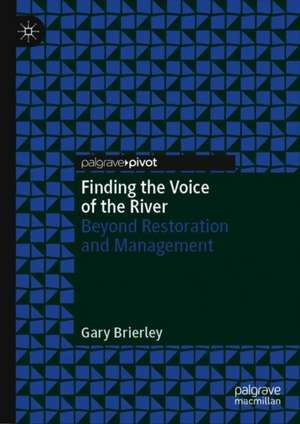Finding the Voice of the River: Beyond Restoration and Management
Autor Gary J. Brierleyen Limba Engleză Hardback – 8 oct 2019
This book addresses societal relationships to river systems, highlighting many unexplored possibilities in how we know and manage our rivers.
Brierley contends that although we have good scientific understanding of rivers, with remarkable prospect for profound improvements to river condition, management applications greatly under-deliver. He conceptualizes approaches to river repair in two very different ways: Medean (competitive) and Gaian (cooperative). Rather than ‘managing’ rivers to achieve particular anthropogenic goals (the former option), this book adopts a more-than-human approach to ‘living with living rivers’ (the latter option), applying a river rights framework that conceptualizes rivers as sentient entities.
Chapters build on significant experience across many parts of the world, emphasizing the diverse array of river attributes and relationships to be protected and the wide range of problems to be addressed. Although the book has an environmental focus, it is framed as an argument in popular philosophy, contemplating the agency of rivers as place-beings. It will be of great value to academics, students and general readers interested in protecting river systems.
Brierley contends that although we have good scientific understanding of rivers, with remarkable prospect for profound improvements to river condition, management applications greatly under-deliver. He conceptualizes approaches to river repair in two very different ways: Medean (competitive) and Gaian (cooperative). Rather than ‘managing’ rivers to achieve particular anthropogenic goals (the former option), this book adopts a more-than-human approach to ‘living with living rivers’ (the latter option), applying a river rights framework that conceptualizes rivers as sentient entities.
Chapters build on significant experience across many parts of the world, emphasizing the diverse array of river attributes and relationships to be protected and the wide range of problems to be addressed. Although the book has an environmental focus, it is framed as an argument in popular philosophy, contemplating the agency of rivers as place-beings. It will be of great value to academics, students and general readers interested in protecting river systems.
Preț: 456.10 lei
Nou
Puncte Express: 684
Preț estimativ în valută:
87.28€ • 90.04$ • 72.83£
87.28€ • 90.04$ • 72.83£
Carte tipărită la comandă
Livrare economică 26 martie-09 aprilie
Preluare comenzi: 021 569.72.76
Specificații
ISBN-13: 9783030270674
ISBN-10: 303027067X
Pagini: 154
Ilustrații: XVIII, 179 p.
Dimensiuni: 148 x 210 x 19 mm
Greutate: 0.45 kg
Ediția:1st ed. 2020
Editura: Springer International Publishing
Colecția Palgrave Pivot
Locul publicării:Cham, Switzerland
ISBN-10: 303027067X
Pagini: 154
Ilustrații: XVIII, 179 p.
Dimensiuni: 148 x 210 x 19 mm
Greutate: 0.45 kg
Ediția:1st ed. 2020
Editura: Springer International Publishing
Colecția Palgrave Pivot
Locul publicării:Cham, Switzerland
Cuprins
1.What Does It Mean to Find the Voice of the River?.- 2. The Socio-ecological River: Socio-economic, Cultural and Environmental Relations to River Systems.- 3. Competitive Versus Cooperative Approaches to River Repair.- 4. A Strategy to Express the Voice of the River.
Notă biografică
Gary J. Brierley is Professor and Chair of Physical Geography in the School of Environment at the University of Auckland, New Zealand. He is co-developer of the River Styles Framework (Brierley and Fryirs, 2005). He has published around 200 international journal articles and book chapters, co-edited books on landscapes and ecosystems of the Upper Yellow River and River Futures and co-wrote a textbook entitled Geomorphic Analysis of River Systems (Fryirs & Brierley, 2012).
Textul de pe ultima copertă
This book addresses societal relationships to river systems, highlighting many unexplored possibilities in how we know and manage our rivers.
Brierley contends that although we have good scientific understanding of rivers, with remarkable prospect for profound improvements to river condition, management applications greatly under-deliver. He conceptualizes approaches to river repair in two very different ways: Medean (competitive) and Gaian (cooperative). Rather than ‘managing’ rivers to achieve particular anthropogenic goals (the former option), this book adopts a more-than-human approach to ‘living with living rivers’ (the latter option), applying a river rights framework that conceptualizes rivers as sentient entities.
Chapters build on significant experience across many parts of the world, emphasizing the diverse array of river attributes and relationships to be protected and the wide range of problems to be addressed. Although the book has an environmental focus, it is framed as an argument in popular philosophy, contemplating the agency of rivers as place-beings. It will be of great value to academics, students and general readers interested in protecting river systems.
Gary J. Brierley is Professor and Chair of Physical Geography in the School of Environment at the University of Auckland, New Zealand. He is co-developer of the River Styles Framework (Brierley and Fryirs, 2005). He has published around 200 international journal articles and book chapters, co-edited books on landscapes and ecosystems of the Upper Yellow River and River Futures and co-wrote a textbook entitled Geomorphic Analysis of River Systems (Fryirs & Brierley, 2012).
Caracteristici
Provides accessible guidance on how to manage our rivers more effectively Presents a hopeful, optimistic, future focus for river science and management Emphasizes the importance of societal relations to rivers as the basis for management applications
